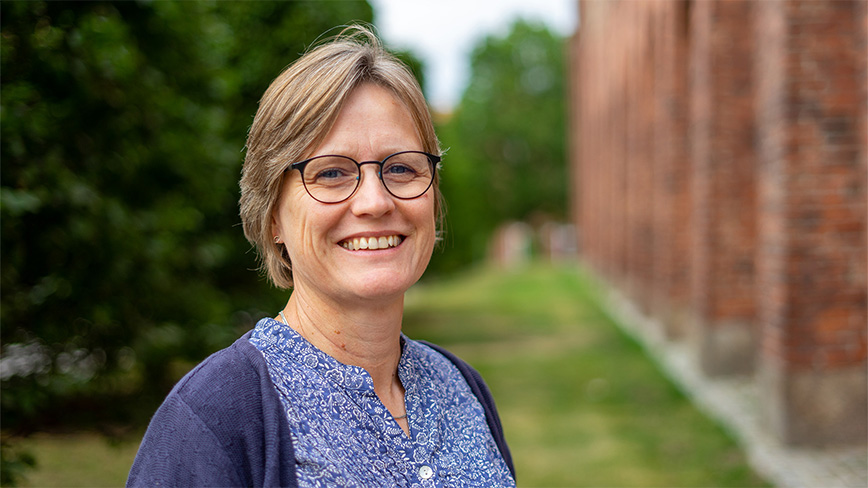Chemical engineering works with society's challenges

The research at the Department of Chemical Engineering spans the fields of energy, environment and chemical engineering towards new processes – work that has recently received increased relevance and attention.
“I feel that we are working with issues that are becoming more and more relevant to society. Interest in the hydrogen area, for example, has increased very much in line with the climate crisis. It's really noticeable,” says Carina Lagergren, Head of Department of Chemical Engineering.
The Department of Chemical Engineering works with issues that have a strong connection to society's challenges. It concerns, for example, the production of new fuels with environmentally friendly technology, such as thermal conversion of biomass and electrolysis of water to produce hydrogen, and the development of electrochemical power sources such as fuel cells and batteries.
“We usually say that we know and work with all things in society that have to do with chemistry, new processes and materials but with a chemical engineering approach. The work takes place on many different levels and we use our chemical engineering methods to study everything from the molecular level up to large systems,” says Carina Lagergren.
Four divisions
The department consists of four divisions with slightly different profiles, distributed on different floors in the same building. Carina Lagergren's own division Applied Electrochemistry deals with electrochemical processes.
“It is about conversion between chemical and electrical energy, in both directions. It includes batteries and fuel cells to produce electrical power and the opposite, where electrical energy is instead used to produce chemicals, for example hydrogen in water electrolysis,” says Carina Lagergren.
Next door is the Energy Processes division, which looks at system aspects of energy systems at different levels, for example how to take care of carbon dioxide in different ways or how to manage the storage of hydrogen gas, for example when used for fossil-free steel production.
“There is a lot of talk about switching to a hydrogen society. There we also come up to the societal level where control instruments and policies must be taken into account, which means that collaborations with other societal actors outside of chemical engineering are important,” says Carina Lagergren.
The resource recovery division is located on the ground floor of the building.
”Their research is more and more popular. How to be able to take care of and make something useful out of what was previously regarded as waste streams? An example is how we should be able to recycle a battery component. They simply work with circularity of topics.”
The fourth division, Process Technology, works, among other things, with catalysis and thermal conversion of biomass for the production of new fuels and a lot with modeling and simulation of various processes related to energy and the environment.
“It's a lot about recycling in different parts and large processes, such as air purification and heat recovery,” says Carina Lagergren.
How can this research make a difference?
“According to the EU's hydrogen strategy that came in 2020, large sums of money must be invested in producing hydrogen in Europe through electrolysis. Several countries, including Sweden, have a hydrogen strategy, so it has really come up on the agenda. The hydrogen area is an example of a research area where the Department of Chemical Engineering can contribute to development.”
Fossil-free steel production has become big and there are two different large constellations in Sweden that work with this, Hybrit and H2 Green Steel. Both are up in Norrland. By reducing the amount of coal in steel production and replacing it with hydrogen, it is possible to reduce carbon dioxide emissions enormously. Chemical Engineering has been involved in projects dealing with the production of hydrogen through water electrolysis and how to store hydrogen in different ways, for example in chemicals in large tanks.
“We also have a large project called PUSH, which is financed with SEK 50 million by the Foundation for Strategic Research. There, three out of four departments are involved together with Umeå University, Chalmers and Lund Universities. The project is also about hydrogen – the production of hydrogen through electrolysis, its use in fuel cells and how to store hydrogen, for example in an organic molecule (LHOC),” says Carina Lagergren.
Is it an exciting time?
“I think so. As a citizen of our earth, it's a little too exciting. Things are not going so well with the climate issues. But we try to contribute with some things to be able to solve these problems, so the issues we work on feel essential.”
In the external research evaluation Research Assessment Exercise, RAE, all KTH's research institutions were evaluated. Chemical Engineering was highly praised for the department's research and ability to attract external funding and develop collaborations. However, the evaluators felt that a strategy was needed for the research, and that it would be good to create more collaborations locally, within KTH and at the EU level.
“We have several examples of transversal collaborations within the department and I think that is good. We also have many collaborations with industry because the area is quite applied. I think we have good collaborations, but perhaps we are not involved enough in EU projects,” says Carina Lagergren.
The institution was also judged to have a clear view of how it is possible to contribute to sustainability, equality and internationalisation, but according to the evaluation needs to improve in terms of data management and digitalisation.
“We had already started working on a road map for the department before the RAE was finished, which deals with the directions our research should take. One person from each department participates in the group working on this. We had a strategy meeting in May where we sat for a whole day and discussed and supported and discussed various things.”
Text: Sabina Fabrizi
